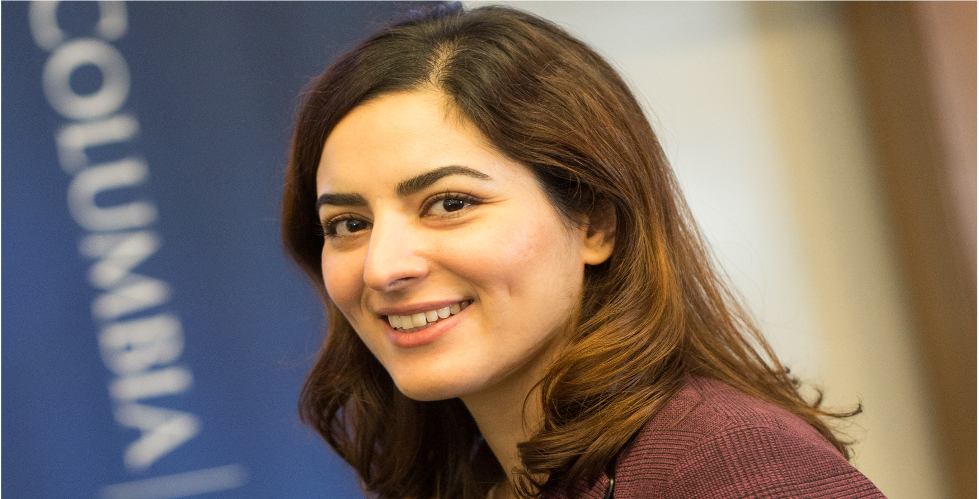Elham Azizi: Applying Machine Learning to Explore Cancer Networks

As one of the inaugural members of the Irving Institute for Cancer Dynamics (IICD), Elham Azizi, PhD, is bringing her background in machine learning to the field of cancer research. With rapid advances in genomic technologies producing large-scale datasets, she became fascinated with developing and applying machine learning techniques to study biological systems, and specifically, to better understand cancer.
Dr. Azizi joined the IICD and Columbia University in January after completing post-doctoral work in computational and systems biology at Memorial Sloan Kettering Cancer Center. There, she worked primarily in combining single cell technologies and genomic datasets to address fundamental biological problems—and also sparked an interest in cancer research.
“Cancer is a global problem affecting various age groups with a significant toll on patients and their families,” says Dr. Azizi, assistant professor of biomedical engineering at Columbia and Irving Assistant Professor of Cancer Data Research at the Irving Institute for Cancer Dynamics. “My lab is consistently motivated by the potential impact our research could have on saving lives. We hope that we can reduce the burden of cancer by applying our technical and computational skills in dissecting the complexity of the disease.”
Dr. Azizi, who also is a member of the Herbert Irving Comprehensive Cancer Center at NewYork-Presbyterian/Columbia, currently studies different populations of cancer cells within a single tumor to identify their disrupted mechanisms. Using statistical machine learning methods to sort through the vast amount of data she collects her research aims to provide a comprehensive view of complex tumor cells as well as the interacting immune cells, and stromal cells in the surrounding microenvironment, which are critical in tumor evolution and treatment response.
“Cancer treatments lead to favorable outcomes only in a subset of patients, partially due to the significant heterogeneity between tumor cells across patients as well as cells within a patient tumor,” explains Dr. Azizi. “The findings of our research can guide the improvement and development of novel treatments tailored to each patient and the composition of cell types in each tumor.”
One of her lab’s immediate focus areas is cancer immunotherapy research. The field has generated cutting-edge treatment options that enable a patient’s own immune system to fight cancer. The Azizi lab and their collaborators are developing computational frameworks that can explain how the immune cells that interface with the tumor evolve in response to treatments. “This could help us identify immune dysfunction mechanisms,” she adds, “and how we can improve immunotherapies which activate the immune system to eliminate cancer.”
Her lab is particularly attempting to analyze and address the mounting amounts of data generated by newer technologies, including single cell transcriptomics and epigenetics, which have been powerful in measuring heterogeneity across cells. However, the analysis of this data pose significant statistical and computational challenges, notes Azizi, due to a variety of factors including the lack of tools available to analyze this highly complex multidimensional data, oftentimes ‘noisy’, and whose technical artifacts are not yet well understood.
Artificial intelligence (AI) and machine learning, which have been successful in handling complex data in other domains, such as computer vision, language or speech processing, can play an important role here. “Fortunately, a lot of concepts in the field of AI and machine learning have solved similar problems but in very different fields – and with different goals,” adds Azizi. “We are working to adapt them to answer questions in the context of cancer biology.”
Columbia’s interdisciplinary environment served as a major draw for Dr. Azizi, who also is affiliated with the Columbia Data Science Institute. As a member of three multi-disciplinary institutes at the University, she is keen on forging collaborations to work on new computational methods motivated by the challenges of cancer biology.
“The genomics field is becoming more and more collaborative, and that really interests me,” says Dr. Azizi. “I come from a math-engineering background but have always been fascinated by biology and medicine. I could have probably followed a path in the signal processing field building mainly theoretical frameworks, but focusing on cancer, we have the important potential impact of improving lives.”
-Melanie A. Farmer
